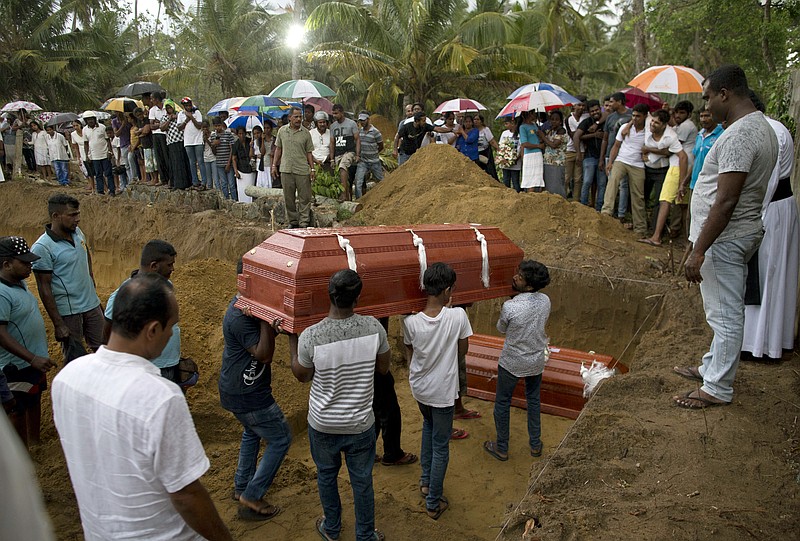COLOMBO, Sri Lanka (AP) - Sri Lanka's president gave the military sweeping police powers starting today in the wake of the Easter bombings that killed nearly 300 people, while officials disclosed that intelligence agencies had warned weeks ago of the possibility of an attack by the radical Muslim group blamed for the bloodshed.
The suicide bombings struck three churches and three luxury hotels Sunday in the island nation's deadliest violence since a devastating civil war ended in 2009. The government shut down some social media, armed security forces patrolled the largely deserted, central streets in the capital of Colombo, and a curfew went into effect.
The military was given a wider berth to detain and arrest suspects - powers used during the civil war but withdrawn when it ended.
Prime Minister Ranil Wickremesinghe said he feared the massacre could unleash instability and he vowed to "vest all necessary powers with the defense forces" to act against those responsible.
Adding to the tension, three unexploded bombs blew up Monday inside a van parked near one of the stricken churches as police were trying to defuse them, sending pedestrians fleeing in panic. No injuries were reported. Dozens of detonators were discovered near Colombo's main bus depot, but officials declined to say whether they were linked to the attacks.
The government blocked access to Facebook, WhatsApp and Instagram after the blasts, creating confusion and doing little to reassure residents and visitors that the danger had passed.
A nationwide state of emergency was scheduled to begin at midnight Monday the president's office said, following the attacks that killed at least 290 people, with more than 500 wounded, police spokesman Ruwan Gunasekara said. The three stricken hotels and one of the churches, St. Anthony's Shrine, are frequented by tourists, and dozens of foreigners were among the dead.
Tourism Minister John Amaratunga said 39 foreigners were killed, although the foreign ministry put out a different figure, saying the number of dead was 31.
The U.S. State Department confirmed at least four Americans were among the dead and several others were seriously wounded, but it did not release any identities. The Sri Lankan government said other foreigners killed were from the United Kingdom, Bangladesh, China, India, France, Japan, the Netherlands, Portugal, Saudi Arabia, Spain, Turkey and Australia.
A national day of mourning was declared for today.
International intelligence agencies had warned the little-known group, National Thowfeek Jamaath, was planning attacks, but word apparently didn't reach the prime minister's office until after the massacre, exposing the continuing political turmoil in the highest levels of the Sri Lankan government.
Health Minister Rajitha Senaratne said the intelligence agencies began issuing the warnings April 4; the defense ministry wrote to the police chief with information that included the group's name; and police wrote April 11 to the heads of security of the judiciary and diplomatic security division.
President Maithripala Sirisena, who was out of the country Sunday, had ousted Prime Minister Ranil Wickremesinghe in October and dissolved the Cabinet. The Supreme Court later reversed his actions, but the prime minister has not been allowed into meetings of the Security Council since October, which meant he and his government were in the dark about the intelligence.
It was not immediately clear what action, if any, was taken after the threats. Authorities said they knew where the group trained and had safe houses, but did not identify any of the suicide bombers, whose bodies were recovered, or the two dozen other suspects taken into custody.
All the bombers were Sri Lankans, but authorities said they strongly suspected foreign links.
Also unclear was a motive. The history of Buddhist-majority Sri Lanka, a country of 21 million including large Hindu, Muslim and Christian minorities, is rife with ethnic and sectarian conflict.
Two other government ministers also alluded to advance knowledge.
Mano Ganeshan, the minister for national integration, said his security officers had been warned by their division about the possibility two suicide bombers would target politicians.
The coordinated blasts took place in the morning at St. Anthony's and the Cinnamon Grand, Shangri-La and Kingsbury hotels in Colombo, as well as the two churches outside Colombo. They collapsed ceilings and blew out windows, killing worshipers and hotel guests, and leaving behind scenes of smoke, soot, blood, broken glass, screams and wailing alarms.
A few hours later, two more blasts occurred just outside Colombo, one at a guesthouse where two people were killed, the other near an overpass, military spokesman Brig. Sumith Atapattu said.
Also, three police officers were killed while searching a suspected safe house on the outskirts of Colombo when its occupants apparently detonated explosives to prevent arrest, authorities said.
A pipe bomb with 50 kilograms of explosives was found and defused late Sunday on a road to the international airport, air force Group Capt. Gihan Seneviratne said. It was powerful enough to have caused damage in a 1,300-foot radius, he said.
U.S. Secretary of State Mike Pompeo said in Washington he spoke to the prime minister and offered assistance. Later, the FBI said it was helping with the investigation.
"This is America's fight, too," he said. "We also stand with millions of Sri Lankans who support the freedom of their fellow citizens to worship as they please. We take confidence in knowing that not even atrocities like this one will deter them from respecting religious freedom."

